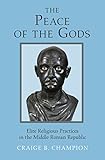The Peace of the Gods : Elite Religious Practices in the Middle Roman Republic / Craige B. Champion.
Material type: TextPublisher: Princeton, NJ : Princeton University Press, [2017]Copyright date: ©2017Description: 1 online resourceContent type:
TextPublisher: Princeton, NJ : Princeton University Press, [2017]Copyright date: ©2017Description: 1 online resourceContent type: - 9780691174853
- 9781400885152
- 292.3 23
- BL803 .C44 2018
- online - DeGruyter
- Issued also in print.
| Item type | Current library | Call number | URL | Status | Notes | Barcode | |
|---|---|---|---|---|---|---|---|
 eBook
eBook
|
Biblioteca "Angelicum" Pont. Univ. S.Tommaso d'Aquino Nuvola online | online - DeGruyter (Browse shelf(Opens below)) | Online access | Not for loan (Accesso limitato) | Accesso per gli utenti autorizzati / Access for authorized users | (dgr)9781400885152 |
Frontmatter -- Contents -- Preface -- Introduction: Studying Elite Religion in the Middle Roman Republic -- One. Elite-Instrumentalism: Persistence and Paradox -- Two. Domi: Priesthoods, Politics, and the People -- Three. Militiae: Commanders, Elite Religion, and Fear of Military Disaster -- Four. Domi et Militiae: Elite Religion at Rome in Response to External Triumphs and Crises -- Five. Understanding Elites' Religious Behaviors in the Middle Roman Republic -- Epilogue -- Acknowledgments -- Bibliography -- General Index -- Index Locorum
The Peace of the Gods takes a new approach to the study of Roman elites' religious practices and beliefs, using current theories in psychology, sociology, and anthropology, as well as cultural and literary studies. Craige Champion focuses on what the elites of the Middle Republic (ca. 250-ca. 100 BCE) actually did in the religious sphere, rather than what they merely said or wrote about it, in order to provide a more nuanced and satisfying historical reconstruction of what their religion may have meant to those who commanded the Roman world and its imperial subjects.The book examines the nature and structure of the major priesthoods in Rome itself, Roman military commanders' religious behaviors in dangerous field conditions, and the state religion's acceptance or rejection of new cults and rituals in response to external events that benefited or threatened the Republic. According to a once-dominant but now-outmoded interpretation of Roman religion that goes back to the ancient Greek historian Polybius, the elites didn't believe in their gods but merely used religion to control the masses. Using that interpretation as a counterfactual lens, Champion argues instead that Roman elites sincerely tried to maintain Rome's good fortune through a pax deorum or "peace of the gods." The result offers rich new insights into the role of religion in elite Roman life.
Issued also in print.
Mode of access: Internet via World Wide Web.
In English.
Description based on online resource; title from PDF title page (publisher's Web site, viewed 23. Mai 2019)


